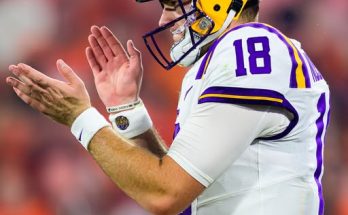The Manning name is one of the most iconic in football history, instantly recognizable and tied to decades of quarterback excellence. Peyton Manning carved out a career that made him one of the greatest to ever play the game, piling up MVP awards and a pair of Super Bowl victories while reimagining the position with his mastery of pre-snap reads. Eli Manning, while not as statistically dominant, wrote his own legend with two Super Bowl wins, both against Tom Brady’s Patriots, and forever earned respect for his clutch performances on the biggest stage. Even their father, Archie Manning, though not fortunate enough to play for a great team, still became a symbol of toughness and leadership as the face of the New Orleans Saints in the 1970s. With that kind of lineage, the name “Manning” carries weight, and it has inevitably influenced how people view Arch Manning, the highly-touted quarterback for the Texas Longhorns. But as one insider, Greg, recently put it, hype that comes from a last name cannot substitute for on-field talent, and that has sparked a growing conversation across the college football world.
Greg’s blunt assessment was that Arch Manning’s Heisman hype is built on legacy rather than production. It’s not that Arch is talentless or undeserving of attention altogether; he clearly has arm strength, athleticism, and upside. The issue, Greg argued, is that many other quarterbacks across college football have already proven themselves at the highest level and still don’t receive the same volume of spotlight or media-driven narrative that Arch does. When fans see preseason Heisman watch lists with Arch’s name placed higher than quarterbacks who have actually carried their teams to big wins, thrown for thousands of yards, and produced in high-pressure situations, the criticism naturally grows louder. Greg believes the Manning name is inflating the perception of where Arch stands compared to his peers, and if you strip away the family history, the hype would not be nearly as strong.
This tension between legacy and merit is not new in sports, but the Manning case is uniquely magnified because of how revered the family name is. At Texas, Arch has shown flashes of ability but has also been inconsistent, struggling with accuracy under pressure and at times looking uncomfortable against elite defenses. His stat lines don’t yet scream “Heisman contender.” Meanwhile, quarterbacks across the SEC, Big Ten, and Pac-12 have consistently delivered against ranked opponents, winning games on the biggest stages. Greg’s point was simple: the sport should be celebrating those proven players instead of prematurely elevating Arch because of who his uncles were. That’s not to say Arch can’t eventually live up to the hype, but he hasn’t yet earned the right to be in that conversation.
For fans, this debate touches on something bigger than Arch himself. It raises questions about how college football markets its stars, how media narratives are shaped, and how legacies affect the opportunities players get. The Manning name is a massive brand in its own right, and having Arch at Texas was always going to bring an avalanche of attention. Even recruiting experts admitted that schools were willing to bend over backwards to land him not just because of his skills but because of the name recognition that would bring headlines, sell tickets, and boost NIL value. Some critics see this as unfair to other athletes who may be just as talented but don’t have the built-in publicity machine. Others argue that attention is part of the business, and if you come from a legendary family, it’s natural that you’ll be scrutinized and spotlighted more heavily.
Still, the Heisman Trophy conversation is supposed to be about performance, not pedigree. When preseason lists project Arch as a frontrunner, it feels to many fans like the system is rewarding name value rather than production. Consider the quarterbacks who have already shown their ability to dominate games week in and week out. Quarterbacks who have beaten top-five teams on national television, quarterbacks who have carried underdog programs into playoff contention, quarterbacks who have proven they can deliver when everything is on the line. These players often fly under the radar compared to Arch, whose last name alone ensures that every throw, every appearance, every practice clip makes headlines. Greg’s frustration—and that of many fans—is not with Arch personally, but with the way college football and media outlets have placed him into a conversation that he has not yet earned.
There’s also an irony to this situation. Arch Manning, by all accounts, is a humble and hardworking player. Coaches and teammates praise his effort, his willingness to learn, and his composure despite immense pressure. He didn’t choose his last name, and he didn’t create the hype machine around him. In many ways, he is a victim of it, constantly having to live up to expectations that are nearly impossible for any young quarterback to meet. Being Peyton’s nephew means fans expect brilliance immediately. Anything short of domination is labeled disappointment. In this way, the Manning name might be as much a curse as it is a blessing, at least in terms of how the public perceives Arch’s development.
For Texas, the situation is delicate. They want to maximize Arch’s talent and give him time to grow, but the constant media attention makes it harder to treat him like any other quarterback. Every mistake is magnified, every game is framed as a referendum on his family legacy. Meanwhile, the team has other players who deserve recognition and who might feel overshadowed by the Manning narrative. Coaches know that football is a team sport, but when the spotlight keeps circling back to one name, it can create a sense of imbalance. Fans too, often feel divided. Some support Arch unconditionally because of the Manning brand, while others root against him simply because they resent the manufactured hype.
Greg’s comments tap into this broader frustration and resonate with many who feel college football should focus on proven production. His stance is that Arch Manning may one day be a great quarterback, but until he actually earns that with his play, the sport should not hand him the keys to the Heisman conversation. The fact that many established quarterbacks with stronger résumés remain overshadowed is not just unfair—it dilutes the credibility of awards that are supposed to honor merit above all else.
But the debate isn’t just about fairness; it’s also about how fans engage with the sport. College football thrives on passion, storylines, and debates like this one. Some fans argue that hype is good for the game, that having a Manning in the spotlight draws casual viewers and brings excitement to every broadcast. Others argue that it skews the narrative and distracts from the true stars of the season. Both sides have merit, and ultimately the discussion becomes a reflection of how we as fans consume the sport. Do we value legacy more, or do we value production more? Should hype be seen as part of the entertainment package, or should it be pushed aside in favor of rewarding the players who actually deliver week after week?
As for Arch Manning himself, his journey is far from over. He still has time to grow into the role and perhaps silence critics by proving that he belongs among the elite. If he develops into a consistent, dominant force for Texas, the narrative could flip entirely, with people saying the hype was justified all along. That’s the beauty of sports: it’s not fixed, and performances on the field can change minds overnight. But until that day comes, Greg’s critique holds weight. You can’t buy talent with a name, and no amount of family history will win games on Saturday night.
Fans should see this as a call to think more critically about the narratives they consume. Who decides which players get the spotlight, and why? How often do we fall into the trap of letting names and brands dictate our attention rather than actual results? These are questions worth asking, not just about Arch Manning, but about college football as a whole. The sport will always be a blend of hype and reality, but the balance between the two is what makes debates like this one so important.
At the end of the day, Arch Manning is still writing his story, and he deserves the chance to do that without unfair expectations drowning out his actual growth. But Greg’s point stands as a reminder that the Heisman conversation should belong to those who have already earned it. The Manning name will always carry weight, but as the saying goes, names don’t win championships, players do.
What do you think? Do you believe the hype around Arch Manning is unfairly inflated by his last name, or do you think it’s just part of how college football works? Do you agree with Greg that other proven quarterbacks deserve more recognition right now, or do you think Arch’s potential justifies the buzz he receives? Drop your thoughts in the comments—I’d love to hear your perspective on whether the Manning name is helping or hurting Arch’s journey and how you think hype should be balanced with real talent on the field.



